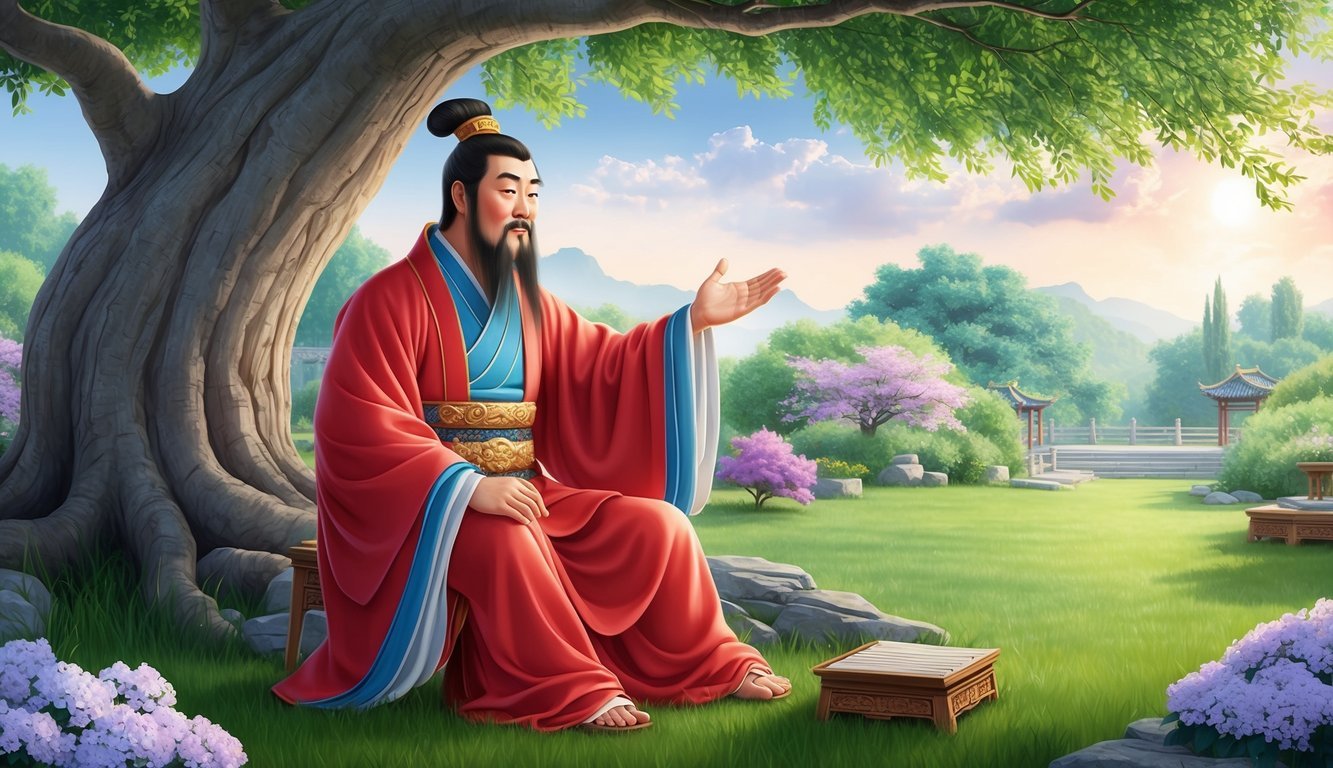Confucius was a Chinese teacher, philosopher, and political theorist born in 551 BCE.
His ideas shaped Chinese culture and values for centuries. His teachings emphasize personal morality, the importance of family, and the value of education.
Living during the turbulent times of the Spring and Autumn Period, he sought to bring harmony to society through his philosophy, known as Confucianism, which has continued to influence countless generations.

Throughout his life, Confucius faced many challenges, including personal loss and political setbacks.
Despite these struggles, he remained committed to his teachings and the belief that a strong moral character leads to a better society.
His key ideas are found in the Analects, a collection of sayings and ideas attributed to him and his disciples.
Today, Confucius’s legacy extends beyond China, impacting the cultures and philosophies of East Asia and the world.
His wisdom still resonates as people seek guidance on ethics, relationships, and community, making his life and teachings ever relevant.
Key Takeaways
- Confucianism focuses on morality, family, and education.
- Confucius faced personal and political challenges but stayed dedicated to his philosophy.
- His teachings continue to influence modern culture and ethics worldwide.
The Life and Times of Confucius
Confucius lived during a time of great change and conflict in ancient China.
His life spanned the late Zhou Dynasty, particularly the Spring and Autumn Period.
Understanding his early years, political struggles, and lasting influence provides insight into why his teachings remain relevant today.
Early Years in Qufu
Confucius was born in 551 BCE in Qufu, located in Shandong Province.
His family was of noble descent, but they faced financial difficulties.
Little is known about his childhood, but it is clear that he had a thirst for knowledge from a young age.
He studied various subjects, including poetry, music, and philosophy.
Growing up during the Spring and Autumn Period, a time marked by political fragmentation, he witnessed significant social change.
This environment shaped his ideas about ethics and governance, which would later form the basis of Confucianism.
The Political Career and Self-Exile
As an adult, Confucius pursued a career in government.
He sought positions that would allow him to implement his ideas on governance.
He briefly held roles as a minister and advisor, promoting moral leadership and good governance.
However, Confucius faced resistance from powerful figures.
Frustrated by the political landscape, he eventually left his home state of Lu and wandered through various states in search of a ruler who would support his reforms.
His time in self-exile involved spreading his teachings and gathering followers, although he did not achieve lasting success during his lifetime.
Final Years and Legacy
In his later years, Confucius returned to Qufu.
He focused on teaching rather than politics.
He compiled and edited classic texts, which helped preserve ancient Chinese literature and philosophy.
Confucius died in 479 BCE, but his teachings lived on.
The Han Dynasty eventually adopted Confucianism as a state philosophy, influencing Chinese culture for centuries.
His ideas on ethics, family, and social harmony continue to resonate today, making him one of history’s most important figures in philosophy and education.
Confucian Philosophy and Teachings
Confucian philosophy is centered around the cultivation of ethical behavior and virtuous living.
Key concepts like Li (ritual propriety) and De (virtue) play essential roles in shaping how individuals relate to each other and their society.
The Core Principles: Li and De
Li and De are foundational concepts in Confucian thought. Li refers to the rituals, customs, and proper conduct that govern social interactions.
It emphasizes respect and order in relationships, whether between family members or leaders and their subjects.
On the other hand, De represents virtue or moral excellence.
It involves qualities like kindness, justice, and integrity.
Confucius taught that a ruler should lead by example, embodying these virtues to inspire others.
Together, Li and De ensure harmony and balance in society.
The Importance of Virtue and Ethical Conduct
Virtue is at the heart of Confucius’s teachings.
He believed that personal morality must precede social harmony.
The “Golden Rule,” a key ethical principle, states that one should treat others as they wish to be treated.
This idea promotes empathy and consideration in all relationships.
Benevolence is another core value in Confucianism.
It encourages individuals to act selflessly and support the well-being of others.
Ethical conduct is not just about individual actions; it’s about fostering a society rooted in shared values, respect, and mutual support.
Virtue is vital for personal development and societal stability.
Confucius’s Influence on Eastern Thought
Confucius’s ideas significantly shaped Eastern thought and culture.
His philosophy influenced not just China but also countries like Korea and Japan.
Concepts like social harmony and moral governance became essential in many Asian societies.
His ideas on ethics and political philosophy contributed to the development of the Mandate of Heaven, which justifies rulers’ authority based on their moral integrity.
Students of Confucius spread his teachings, making them a backbone of Chinese philosophy.
The focus on wisdom, ethics, and virtue continues to have a lasting impact on modern views, showing how ancient teachings remain relevant today.
Canonical Texts and Disciples

Confucius’s teachings have been preserved and expanded through various texts and his disciples.
Central to these writings are the Four Books and Five Classics, which capture the essence of Confucian thought.
The contributions of his disciples further shaped the philosophy and its interpretations over the centuries.
The Analects: Confucius’s Most Famous Work
The Analects is a collection of sayings and ideas attributed to Confucius.
Compiled by his disciples, this text includes dialogues and ethical teachings that reflect Confucian ideals.
It covers virtues like filial piety, loyalty, and righteousness.
The Analects is organized into twenty books, each with concise statements.
For example, one famous quote emphasizes the importance of learning and reflection: “Is it not a joy to have friends come from afar?” This text serves as a foundation for moral conduct, making it a crucial part of Confucian education.
Influential Disciples and Their Contributions
Confucius had many disciples who played important roles in spreading his ideas.
Among them, Mencius is highly regarded.
He advocated for the innate goodness of human beings and emphasized the importance of benevolent governance.
Another key figure is Zhu Xi, a later thinker who merged Confucianism with Neo-Confucian principles.
His commentaries on the Four Books greatly influenced Confucian thought during the Song Dynasty.
Zhu Xi emphasized personal moral development and the study of classical texts.
These disciples helped to interpret and expand Confucian teachings, making them relevant through different eras.
Expansion and Interpretation: From Mencius to Zhu Xi
Mencius and Zhu Xi represent significant phases in the evolution of Confucianism.
Mencius introduced concepts like compassion and human nature, diverging from Confucius’s focus on social harmony.
Zhu Xi, on the other hand, organized Confucian texts into what became known as the Four Books: the Great Learning, the Doctrine of the Mean, the Analects, and the Mencius.
He emphasized a systematic study of these works, which shaped education in China for centuries.
Their interpretations laid the groundwork for Neo-Confucianism, blending Confucian ideals with Buddhist and Daoist elements.
This fusion allowed Confucianism to adapt and thrive, guiding moral and social conduct through history.
Cultural Impact and the Confucian Revival

Confucius’ teachings have shaped Chinese culture deeply, influencing moral values, social behavior, and even politics.
His ideas continue to resonate today, reflecting both historical significance and modern revival.
Confucianism as State Ideology in Imperial China
In Imperial China, Confucianism became the backbone of the state’s philosophy.
It emphasized hierarchy, respect for elders, and the importance of education.
Under the Han Dynasty, Confucian ideas were formalized, leading to their adoption in the civil service exams.
This helped create a bureaucracy grounded in Confucian values.
During the Tang and Song Dynasties, Confucianism evolved into Neo-Confucianism, blending with Buddhist and Daoist elements.
The focus on ethics and governance became crucial for ruling effectively.
Confucianism defined the social order and maintained stability in society.
The rigid hierarchies established during this period still influence social structures in China today.
Modern Confucianism and Global Influence
In recent years, Confucianism has experienced a revival, particularly in China.
The Communist Party has shown renewed interest in Confucian ideas as a foundation for national identity and moral governance.
This move aims to unify society amid rapid modernization and globalization.
Globally, Confucianism impacts education and social policies. Confucius Institutes promote his teachings worldwide, highlighting their relevance in contemporary discussions about ethics and governance.
The values of respect, community, and harmony appeal to many, encouraging dialogue on how these lessons can apply to modern life.
The Role of Confucianism in Contemporary Society
Today, Confucianism continues to influence social behavior and family dynamics in China and beyond.
Many people value its lessons on filial piety and communal well-being.
Confucian principles guide not only personal conduct but also business ethics and political policies.
In urban areas, there’s a clear blend of traditional values with modern practices.
Families often still prioritize education and respect for elders, reflecting Confucian ideals.
This cultural persistence showcases the adaptability of Confucianism in addressing current societal challenges.
Its role in both personal and communal life emphasizes the depth of its ongoing impact.
The Legacy of Confucius Today
Confucius’s teachings continue to shape various aspects of society, including education and politics.
His influence is evident in the preservation of cultural values and social harmony in modern times.
Confucian Temples and the Kong Family
Confucian temples are important cultural sites throughout China and beyond.
These temples serve as places of worship and reflection on Confucius’s life and teachings.
The Kong family, descendants of Confucius, play a key role in preserving his legacy.
They maintain the Temple of Confucius in Qufu, Shandong province.
This temple is a significant pilgrimage site, attracting visitors interested in Confucian ideals and Chinese culture.
Ceremonies held here honor Confucius’s contributions to education and ethics.
These traditions help keep his teachings alive and relevant in today’s society.
Confucius’s Influence on Modern Education and Politics
Confucius emphasized the importance of education and moral integrity, principles that still resonate today.
Schools in East Asia often incorporate Confucian values into their curricula.
Respect for teachers and the importance of hard work are key themes.
In politics, Confucianism advocates for benevolent governance.
Many leaders reference his teachings when discussing ethical leadership and social responsibilities.
This influence can be seen in policies promoting family values and community harmony.
Confucian ideals encourage citizens to participate in civic life.
This spirit of engagement helps strengthen social cohesion in contemporary society.
Interpreting Confucian Ideas in the 21st Century
Confucianism faces new challenges in a rapidly changing world.
Modern interpretations focus on adapting his ideas to current issues such as globalization and technology.
Many scholars view Confucianism as a framework for social harmony in diverse societies.
Confucius’s teachings promote values like respect and humanism.
These values encourage dialogue and understanding among different cultures.
Discussions on environmental ethics are also influenced by Confucian principles.
The emphasis on balance and respect for nature aligns with sustainability efforts today.
Confucian teachings remain a vibrant part of contemporary thought and practice, offering guidance on ethical living in the modern world.


